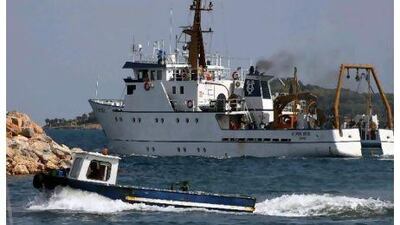NICOSIA // The United Nations has urged restraint in a heated dispute between Turkey and Cyprus over exploration for potentially huge underwater gas reserves south of the divided Mediterranean holiday island.
The stakes are high, with political and energy security ramifications for the region and beyond. Ankara sharply escalated tensions on Tuesday by provocatively sending a military-escorted research vessel into waters where Cyprus, shrugging off Turkish warnings, began exploratory drilling last week using a US company, Noble Energy.
The Greek Cypriots, with a population of less than 1 million, are no military match for Turkey. But they represent the island internationally and have a powerful diplomatic shield: Washington and the European Union have backed Cyprus's sovereign right to drill for gas in its own economic exclusion zone.
Alexander Downer, the UN's Cyprus envoy, said late on Tuesday that the hydrocarbon dispute had not affected prolonged reunification talks between the Greek and Turkish Cypriots and hoped that would not change.
An increasingly assertive Turkey had demanded that the Greek Cypriots postpone drilling until there was a Cyprus settlement. Otherwise, Ankara argued, the Turkish Cypriots, whose breakaway state has been recognised only by Turkey, would lose out on a share of any gas riches.
Many experts believe that Turkey has another unstated aim: to block Greek Cypriot ambitions of becoming a regional gas exporting hub, a role Ankara covets.
Turkey hosts several large pipeline projects that together are called the Southern Gas Corridor, designed to provide Europe with Central Asian and Caspian Sea gas, mainly from Azerbaijan, but potentially also from Turkmenistan, Iraq and Iran.
"By holding up progress with [Cypriot] drilling in the Mediterranean, Turkey would be serving its own interests as the need for imports of pipeline gas [to Europe] will be greater," Caroline Bain of the Economist Intelligence Unit told Reuters.
A western diplomat in Nicosia agreed, saying: "Beyond the Cyprus problem, Turkey feels that its own energy strategy is being challenged."
Cyprus and Israel signed a bilateral agreement last year marking out their maritime boundaries and are drilling in an area believed to hold the world's largest gas finds of the past decade. Noble hopes to confirm estimates that Cyprus's Aphrodite field, 185km south-east of the island, holds 10 trillion cubic feet of gas.
Such dazzling hydrocarbon wealth would also transform Cyprus politically and economically, challenging Ankara's growing ambitions to become a regional superpower, analysts said.
"Big gas finds would dramatically strengthen the Greek Cypriots' power-political position," said Hubert Faustmann, an analyst at the University of Nicosia. "Cyprus would become a very interesting country for the EU and even the US, which are keen to see energy resources developed."
Noble has already confirmed gas deposits of 16 trillion cubic feet in Israel's nearby Leviathan field and Cyprus has been primed as the obvious location for a liquefaction plant to process gas from both countries, which would then be ferried by tanker to Europe. Unless, that is, there was a Cyprus settlement. Then the most viable export route would be by pipeline to Turkey where it could mesh with existing pipelines.
Diplomats hope that the clear benefits for all parties would serve as an incentive to resolve the Cyprus problem. There were few signs it will.
Turkey has challenged not only the right of Cyprus, an EU member that it does not recognise, but also Israel, a spurned ally and fellow regional superpower, to exploit their offshore resources.
The Turkish prime minister, Tayyip Erdogan, has branded their drilling as "madness" and warned earlier this month that he was ready to send warships to "monitor" their activities.
When Noble began drilling last week, Turkish warships, on military exercises in the area, kept an eye from a discreet distance, but did not interfere with the American rig.
Turkey instead retaliated by signing a continental shelf agreement with the Turkish Cypriots. And it dispatched an oil and gas research vessel, the ageing Piri Reis, named after a 16th-century Ottoman sea captain and cartographer, to start exploring in the area.
That continental shelf accord was condemned by the Greek Cypriots, while regional maritime experts said it signified a symbolic show of defiance that carried little legal weight because the Turkish Cypriot state has not been recognised internationally.
Even so, Turkey seemingly believed its agreement with the Turkish Cypriots would pave the way for its own fledgling offshore gas and oil development in the region, analysts said.
"Piri Reis, escorted by warships, has started research in the same area where Greek Cypriots are exploring," Omer Celik, the vice chairman of Turkey's ruling AKP who oversees foreign affairs, declared on Twitter. "We have shown clearly to everyone that we will not allow the eastern Mediterranean to become a Greek Cyprus-Israeli goal," he said in another message on Tuesday.
Cyprus, a former British colony, has been divided since a Turkish invasion in 1974 that was triggered by a brief coup in Nicosia engineered by the military junta then ruling Greece. Turkey still has 35,000 troops stationed in northern Cyprus and the gas dispute might set back its already faltering, long-term quest to join the European Union.
To ease rising tensions and bolster Cyprus's diplomatic position in the row, Demetris Christofias, the Greek Cypriot president, declared last week that any gas bonanza would be shared with the Turkish Cypriots, even before a reunification deal. Previously, his government had said the smaller and less affluent Turkish Cypriot community could only share the prize after a Cyprus settlement.
Mr Faustmann said in an interview: "To offer sharing the proceeds before a solution is a huge step by the Greek Cypriots that undermines Turkey's attempts to justify its position in the energy dispute."

